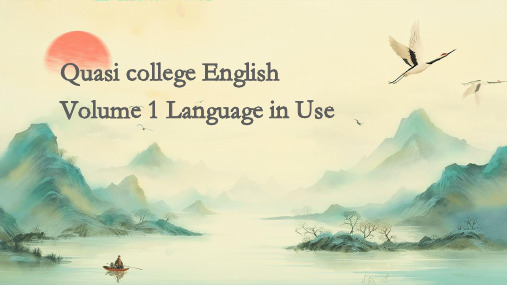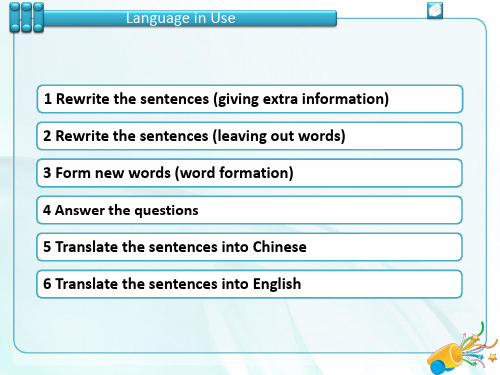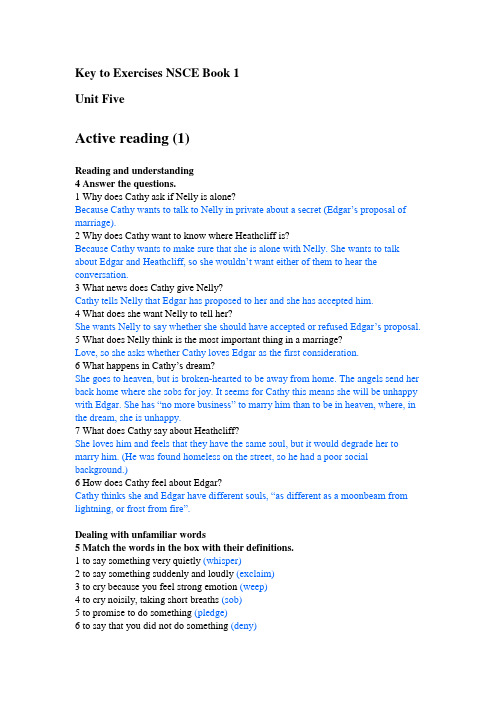新目标大学英语1u5LanguageinUse-精品文档
标准大学英语第一册Languageinuseu

Teacher feedback
教师反馈的意义
教师反馈应以鼓励和引导为主,激发学生的积极 性和主动性,提高学生的学习效果。
教师反馈是学生学习过程中的重要环节,能够帮 助学生了解自己的学习状况,发现不足之处并加 以改进。
教师反馈应具体、有针对性,能够让学生清楚地 了解自己的问题所在,并给出具体的改进建议和 方法。同时,教师也应及时、准确地给予学生反 馈,以便学生能够及时调整自己的学习策略。
01
通过模拟各种生活场景,如购物、旅行、就医等,练习实际的 语言应用。
ห้องสมุดไป่ตู้
02
学会在不同的场景中运用恰当的词汇和表达方式,提高语言运
用能力。
通过角色扮演和小组讨论等形式,模拟真实情境中的交流,增
03
强实际操作能力。
Cross cultural exchange
1
了解不同国家和地区的文化背景和价值观,提高 跨文化意识。
The course follows a quasi-college format, aiming to simulate the experience of taking a college-level English course.
It is suitable for students who have a basic knowledge of English and want to improve their language proficiency for academic and professional purposes.
Breaks
Allowing time for breaks during study sessions. Prolonged study without breaks can lead to fatigue and decreased efficiency.
新目标大学英语1unit1 Language in Use

(keep/ strike/ seek/ maintain/ lose/ change/ affect/ destroy) a balance
Language in Use
“Verb + Noun” collocation
3) Fill in the blanks in the box with verbs that collocate with “decision”, “life” and “problem” in Ex. 6.
1) It would be sensible for you to discuss the making a matter with your parents before________ decision.
reach a 2) “The reason why we were unable to ______ decision is that everybody has his or her own opinion,” he said.
leave open-mouthed, take one’s breath away, unbelievable, shocking, stunning
Language in Use
Words and phrases expressing feelings and emotions
Look for words and phrases in the text expressing the author’s feelings and emotions. After I enrolled at Harvard, I was eager to start the next phase of my life, but anxious at the thought of being across the country so far from home. (Para. 4) More words and phrases expressing anxiety: butterflies in one’s stomach, worried, longing, yearning, impatient, eager
新标准大学英语第一册Languageinuseunit2

air airsick
car carsick
fiction non-fiction help helpful
sea seasick
shop shopaholic
smoker non-smoker spoon spoonful
stop non-stop
work workaholic
Language in Use
shopaholic
3 what something is if it is useful and providing help?
helpful
4 what a flight is if it goes directly from one place to
another?
non-stop
5 someone who doesn’t smoke?
Language in Use
5 The world’s best-selling type of chocolate, milk chocolate, didn’t appear until the end of the 19th century. Milk chocolate is sweeter and smoother than dark chocolate. The world’s best-selling type of chocolate, milk chocolate, which is sweeter and smoother than dark chocolate, didn’t appear until the end of the 19th century.
non-smoker
6 writing which is about real people and events, not
[实用参考]新标准大学英语综合教程Language-in-use
![[实用参考]新标准大学英语综合教程Language-in-use](https://img.taocdn.com/s3/m/2e5d5bea9ec3d5bbfd0a7480.png)
1 Look at the sentences from the passages. But most people were either looking to continue their studies, or to make a living with a white-collar job in a bank … After all, we never quite know when the hooded, scythe-carrying, bringer-of-the-last-breath might come-acalling. The novel that you want to write, the trip to the Grand Canyon you've always planned to take, your mind's-eye dream-job, the West End play you want to direct – you have to do them now.
Language in Use
Rewrite the sentences using It is / was not just that … but … 1 Not only were the shops all closed for Thanksgiving, there was also no one in the streets. It wasn’t just that the shops were all closed for Thanksgiving, but there was no one in the streets. 2 Not only did she spend all her time at college going to parties, she also took the time to gain a first-class degree. It wasn’t just that she spent all her time at college going to parties, but she took the time to gain a firstclass degree.
M1U5 Using language

to whom He is a man ____ whom I never spoke.
他这个人我从来都不理。
1. Julia was good at German, French and Russian, all of _____ she spoke fluently. (2011湖南) A. who B. whom C. which D. that 2. She showed the visitors around the museum, _____ the construction had taken more than three years. (2011江西) A. for which B. with which C. of which D. to which
名 词,而不能用 若后接动词,要用动 ___ 不定式 。如: _______ He narrowly escaped _____ being _________. drowned 他险些被溺死。 There is no way to ______ escape ______ dБайду номын сангаасing the work. 没有办法逃脱做这项工作。
He didn’t finish his homework yesterday. He didn’t go to school so he escaped _______ by the teacher. A. punishing B. from punishing C. from being punished D. not to be punished
2. Nelson Mandela showed how good a leader he was because __________. A. he fought the guards in prison B. he refused to let the guards study in his school C. he let the guards study in his school but not take the exams. D. he let the guards study even though the prisoners could not take the exams
新标准大学英语综合教程1答案及全文翻译第5单元

Key to Exercises NSCE Book 1Unit FiveActive reading (1)Reading and understanding4 Answer the questions.1 Why does Cathy ask if Nelly is alone?Because Cathy wants to talk to Nelly in private about a secret (Edgar’s proposal of marriage).2 Why does Cathy want to know where Heathcliff is?Because Cathy wants to make sure that she is alone with Nelly. She wants to talk about Edgar and Heathcliff, so she wouldn’t want either of them to hear the conversation.3 What news does Cathy give Nelly?Cathy tells Nelly that Edgar has proposed to her and she has accepted him.4 What does she want Nelly to tell her?She wants Nelly to say whether she should have accepted or refused Edgar’s proposal.5 What does Nelly think is the most important thing in a marriage?Love, so she asks whether Cathy loves Edgar as the first consideration.6 What happens in Cathy’s dream?She goes to heaven, but is broken-hearted to be away from home. The angels send her back home where she sobs for joy. It seems for Cathy this means she will be unhappy with Edgar. She has “no more business” to marry him than to be in heaven, where, in the dream, she is unhappy.7 What does Cathy say about Heathcliff?She loves him and feels that they have the same soul, but it would degrade her to marry him. (He was found homeless on the street, so he had a poor social background.)6 How does Cathy feel about Edgar?Cathy thinks she and Edgar have different souls, “as different as a moonbeam from lightning, or frost from fire”.Dealing with unfamiliar words5 Match the words in the box with their definitions.1 to say something very quietly (whisper)2 to say something suddenly and loudly (exclaim)3 to cry because you feel strong emotion (weep)4 to cry noisily, taking short breaths (sob)5 to promise to do something (pledge)6 to say that you did not do something (deny)7 to stop someone from doing something, like speaking (interrupt)8 to start something again, like speaking (resume)9 to breathe out slowly, especially because you are sad (sigh)10 to say the opposite of what someone has said is true (contradict)Now check (¸) the reporting verbs which give most information about emotions. exclaim, weep, sob, pledge, sigh, contradict6 Replace the underlined words with the correct form of the words in the box.1 He was resting with his knees on the ground beside her when he asked her to marry him. (kneeling)2 It was traditional to ask for the father’s permission to marry the daughter. (consent)3 Her feelings towards him became different as she got to know him better. (altered)4 He continued with his argument, even though she didn’t agree with him. (pursued)5 Her refusal to admit what had happened made him get angry. (denial)6 He came home in a terrible mood and threw his bag onto the floor. (temper; flung)7 Answer the questions about the words and expressions.1 When you rock a baby, do you move it backwards and forwards (a) gently, or (b) violently?2 If you are having a doze, are you (a) asleep, or (b) working?3 If someone’s behaviour is shameful, should they (a) be proud of what they have done, or (b) feel very sorry about what they have done?4 If you aren’t worried about anything, save your own concerns, does this mean (a) you don’t have to be worried, or (b) you’re only worried about your own business?5 If you do something sulkily, will people notice that you are in (a) a good mood, or (b)a bad mood?6 Is a look which turns off someone’s bad temper likely to be (a) gentle, or (b) angry?7 If you come to the point, do you (a) come to the end of something, or (b) say what is important?8 If something is no business of yours, should you (a) be interested in it, or (b) not be interested in it?9 If something degrades someone, does it make people respect them (a) less, or (b) more?10 Does “What good is it doing something?” mean (a) “Why do it?”, or (b) “Is it a good thing to do?”Active reading (2)Dealing with unfamiliar words4 Match the words in the box with their definitions.1 a strong feeling of sadness (grief)2 a round shape or curve (loop)3 an image that you see when you look in a mirror (reflection)4 to let something fall off as part of a natural process (shed)5 a smooth and beautiful way of moving (grace)6 attractive (cute)7 continuing to support someone or be their friend (faithful)8 to cover something by putting something such as paper or cloth around it (wrap)9 not bright (dim)5 Complete the sentences with the correct form of the words in Activity 4.1 I’ve been faithful to my husband all my life.2 I’d like to give this as a present. Could you wrap it for me in silver paper, please?3 The public expression of grief after the death of the princess lasted for several days.4 She dances with such grace! I think she could become a professional dancer.5 I can’t see very well in here. The light’s rather dim.6 When I saw my reflection in the mirror this morning I got a shock.6 Answer the questions about the words.1 Does a bill refer to (a) a bird’s mouth, or (b) a request for money in the poem?2 Is satin (a) a soft delicate material, or (b) a hard rough material?3 If something is wobbling, is it (a) not moving, or (b) moving unsteadily?4 Does platinum refer to (a) a colour like silver, or (b) a colour like gold?5 Is something that is lethal (a) very friendly, or (b) extremely dangerous?6 If a cloth has been embroidered, is it likely to be (a) multi-coloured, or (b) uncoloured?Language in Usewhatever, whoever etc1 Rewrite the sentences with the word in brackets.1 I don’t know who wrote this poem, but he was very romantic. (whoever) Whoever wrote this poem was very romantic.2 Heathcliff may be anywhere, but he isn’t in the house. (wherever)Wherever Heathcliff may be, he isn’t in the house.3 I don’t know what to say, because she doesn’t listen to me any more. (whatever) Whatever I say, she doesn’t listen to me anymore.4 Every time I told him a secret, he told his friends. (whenever)Whenever I told him a secret, he told his friends.5 Anything may happen, but I will always be faithful. (whatever)Whatever happens, I will always be faithful.6 I don’t know who sent me this parcel, but they know I like chocolates. (whoever) Whoever sent me this parcel knows I like chocolates.7 I’m not exactly sure what I’m eating, but it’s very nice. (whatever)Whatever I’m eating, it’s ve ry nice.8 You may end up anywhere in the world, but I will never forget you. (wherever)Wherever you end up in the world, I will never forget you.present participles2 Rewrite the sentences.1 Since I felt concerned, I asked her to phone me the next day.I, feeling concerned, asked her to phone me the next day.2 When Judith fell asleep she was clinging to her teddy bear.Judith fell asleep, clinging to her teddy bear.3 Sarah dried her eyes and tried to smile.Sarah, drying her eyes, tried to smile.4 H e took out the card and said, “This valentine’s for me.”“This valentine’s for me,” he said, taking out the card.5 I was waiting for the train when I read that poem.I waited for the train, reading that poem.6 Since I didn’t have much money with me, I couldn’t pay for the meal.I, not having much money with me, couldn’t pay for the meal.no more … than3 Look at the sentence and answer the question.I’ve no more business to marry Edgar Linton than I have to be in heaven.Cathy means that (c) .(a) if she marries Edgar Linton she will feel as if she’s in heaven(b) she won’t go to heaven if she married Edgar Linton(c) she doesn’t want to marry Edgar Linton and doesn’t feel she should be in heaven4 Rewrite the sentences using no more … than .1 I have no reason to get married, and I’ve got no reason to change my job.I have no more reason to get married than (I have) to change my job.2 She’s got no reason to feel unhappy, and no reason to celebrate.She’s got no more reason to feel unhappy than (she has) to celebrate.3 There’s no point in waiting here, and no point in calling a taxi.There’s no more point in waiting here than (there is) in calling a taxi.4 We have no interest in starting this task, or in finishing the first one.We have no more interest in starting this task than (we have) in finishing the first one.5 I’ve got no business to advise her about her private life, nor should she advise me about mine.I’ve got no more business to advise her about her private life than she has to advise me about mine.6 I have no wish to start a new relationship, or to write another book.I have no more wish to start a new relationship than (I have) to write another book. collocations5 Read the explanation of the words. Answer the questions.1 pursue To pursue means to follow a course of activity.(a) If you pursue the matter, you are likely to try to reach a decision (you don’t abandon it).(b) When you pursue your career, you have the career you want and you want to get ahead in it.(c) If the police are pursuing their inquiries, they haven’t solved the crime, and are still investigating it.2 denial A denial is a statement that something did not happen or isn’t true.(a) If you’re in denial about your age, you don’t admit how old you are.(b) If a company issues a strong denial of responsibility, they don’t admit to having done anything wrong.3 temper If you have a temper, you tend to get angry very quickly.(a) When tempers flare, people get angry.(b) If someone tells you to keep your temper during a discussion, they are likely to be telling you to calm down, and you shouldn’t lose your temper.(c) If people fly into a temper, they lose their temper very quickly and get really angry.4 wrap To wrap something is to cover something in cloth or paper.(a) If you wrap up a meeting, you finish it (because wrapping up a package is the last stage of preparing a gift or buying something).(b) If you’re wrapped up in your work, it interests you very much, and you spend a lot of time doing it or thinking about it, s o you don’t notice anything else.(c) If you keep something under wraps, you keep it secret (as if it is a package wrapped up so other people can’t see what it is).6 Translate the sentences into Chinese.1 Her lips were half asunder as if she meant to speak; and she drew a deep breath, but it escaped in a sigh, instead of a sentence.她半张着嘴,似乎想说什么;她深深地吸了一口气,可随之而来的却是一声无语的叹息。
新目标大学英语1u5Language in Use.ppt

6) They ate in an Italian restaurant, which is a little _o_u_t _o_f _th_e__w_a_y_.
1 Quotations related to growing up
2
Collocations: prepositions with "hand" and "way"
3 Word formation: roots
4 Translation of that-clauses
5
Translation of sentences using sentential adverbs
Language in Use Word formation: roots
Exercise 7 Choose the word that best completes each sentence. 1) What _A__ me most to the job was the chance to
travel.
_o_n_ the way(在去……的路上)
_a_t hand(在手边)
_i_n_ the way(妨碍的;挡道的)
o_n_ hand(现场;在现场) _o_u_t_o_f_ the way(偏远的)
_b_y_ the way(顺便说说)
_u_n_d_e_r way(进行中)
Language in Use
1. You cannot protect yourself from sadness without protecting yourself from happiness. ― Jonathan Safran Foer
新标准大学英语第一册-unit1-Language-in-usePPT课件

(b) used for describing what is happening at the same time
(c) used for saying what you do not do when you do something else
(d) used for saying what someone or something
does not have
a
1 … with my mother red in the face and
short 2021/3/9
of
授课:XXX
breath
2
Language in Use
(a) used for saying what possessions, qualities, or features someone or something has
2021/3/9
授课:XXX
1
Language in Use
1 Match the sentences with the uses of with / without .
(a) used for saying what possessions, qualities, or features someone or something has
Language in Use
1 Match the sentences with the uses of with / without 2 Rewrite the sentences using with / without 3 Read the explanations of the words and expressions 4 Complete the sentences using the collocations in Activity 3 5 Translate the sentences into Chinese 6 Translate the sentences into English
- 1、下载文档前请自行甄别文档内容的完整性,平台不提供额外的编辑、内容补充、找答案等附加服务。
- 2、"仅部分预览"的文档,不可在线预览部分如存在完整性等问题,可反馈申请退款(可完整预览的文档不适用该条件!)。
- 3、如文档侵犯您的权益,请联系客服反馈,我们会尽快为您处理(人工客服工作时间:9:00-18:30)。
2
Collocations: prepositions with "hand" and "way"
3 Word formation: roots
4 Translation of that-clauses
5
Translation of sentences using sentential adverbs
_o_n_ the way(在去……的路上)
_a_t hand(在手边)
_i_n_ the way(妨碍的;挡道的)
o_n_ hand(现场;在现场) _o_u_t_o_f_ the way(偏远的)
_b_y_ the way(顺便说说)
_u_n_d_e_r way(进行中)
Language in Use
实现不了目标的唯一阻碍就是,你一直不敢相信 自己有能力实现它。
6. When you know better you do better. ― Maya Angelou
越知识渊博,越得心应手。 ——玛雅·安格洛
Language in Use
Quotations related to growing up
Collocations: prepositions with "hand" and "way"
Then complete the following sentences with the collocations you have learned.
1) Camera _in__h_a_n_d_, he got on his knees, photographing the children at their level.
2) Many steps of production are done _b_y__h_a_n_d_ but we also use the latest technology.
—— 克洛德·列维·斯特劳斯
8. In every end, there is also a beginning. ―Libba Bray
每一次结束同时也是一次开始。 —— 利巴·布雷
Language in Use
Hale Waihona Puke Collocations: prepositions with "hand" and "way"
Exercise 6
Fill in the blanks in the box with prepositions that collocate with “hand” and “way”.
_in_ hand(在手头;在掌控中)_a_lo_n_g_ the way(一路上;沿途)
_b_y hand(用手)
不要因渴望得不到的而错过已经拥有的;要知道, 现在已经拥有的,也曾是你渴望的。
——伊壁鸠鲁
Language in Use
Quotations related to growing up
5. The only thing standing between you and your goal is the story you keep telling yourself as to why you can’t achieve it.
Quotations related to growing up
2. We don’t realize that, somewhere within us all, there does exist a supreme self who is eternally at peace. ―Elizabeth Gilbert
7. The scientist is not a person who gives the right answers, she’s the one who asks the right questions. ―Claude Lévi-Strauss
科学家不是给出正确答案的人,而是能恰当提问 的人。
1. You cannot protect yourself from sadness without protecting yourself from happiness. ― Jonathan Safran Foer
稳不住幸福,亦躲不过悲伤。 ——乔纳森·萨弗兰·福尔
Language in Use
解决问题比提出问题要简单得多。 ——阿尔伯特·爱因斯坦
Language in Use
Quotations related to growing up
4. Do not spoil what you have by desiring what you have not; remember that what you now have was once among the things you only hoped for. ― Epicurus
或许我们自己都不曾察觉,我们内心一直有个恒 定平和的自我。
——伊丽莎白·吉尔伯特
Language in Use
Quotations related to growing up
3. We can not solve our problems with the same level of thinking that created them. ―Albert Einstein
我们每个人都痛苦,却不愿去理解它;我们都有 伤痕,却宁愿将伤掩得严严实实;我们都在战斗, 却甚至不知道自己在战斗。
Language in Use
Quotations related to growing up
Understand more quotations related to growing up:
6 Useful expressions
Language in Use
Quotations related to growing up
We all ache of pains we choose not to understand, we all wear scars we choose to perfectly conceal and we all battle wars we don’t even realize we’re battling. (Para.7)
